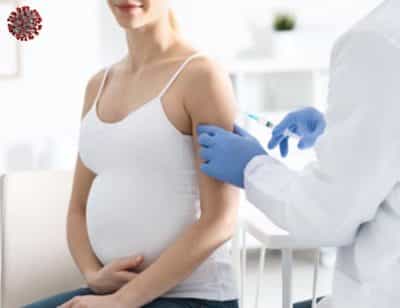COVID-19 Vaccines While Pregnant or Breastfeeding
Pregnant people are more likely to become seriously ill with COVID-19 compared to people who are not pregnant. If you are pregnant, you can get a COVID-19 vaccine. Getting a COVID-19 vaccine during pregnancy can protect you from serious illness from COVID-19.
Pregnant women at risk of serious illness from COVID-19
Although the overall risk of serious illness is low, pregnant and recently pregnant people are at greater risk of serious illness from COVID-19 compared to people who are not pregnant. Serious illness includes hospitalization, intensive care, or illness that requires a ventilator or special equipment to breathe, or illness that results in death. In addition, pregnant women with COVID-19 are at risk of preterm delivery and may be at higher risk for other adverse pregnancy outcomes compared to pregnant women without COVID-19.
If you are faced with a decision about whether to get the COVID-19 vaccine while pregnant, consider:
- Your risk of exposure to COVID-19
- Serious illness risks
- Known benefits of the vaccine
- Limited but growing evidence on the safety of vaccines during pregnancy.
Pregnant women at risk of serious illness from COVID-19
Based on how these vaccines work in the body, it seems unlikely to pose a risk to people who are pregnant. However, there is currently limited data on the safety of COVID-19 vaccines in pregnant people.
Clinical trials are ongoing or planned to investigate the safety of COVID-19 vaccines and how well they work in pregnant people. Vaccine manufacturers also collect and review data from people who received the vaccine and became pregnant in completed clinical trials.
- Animal studies in this area have found no safety concerns in pregnant animals or their infants with the COVID-19 vaccine before or during pregnancy.
- Data collected so far by various international research centers have not identified any safety concerns for vaccinated pregnant women or their babies. Research and data collection are continuing. We continue to follow people who have been vaccinated during all trimesters of pregnancy to understand the effects on pregnancy and babies.
Moderna and Pfizer-Biontech are live vaccines. mRNA vaccines COVID-19 vaccines do not contain live virus and therefore, COVID-19 is not introduced into the body. In addition, mRNA vaccines do not interact with a person’s DNA or cause genetic changes because mRNA does not enter the nucleus of the cell where our DNA is located.
Getting Vaccinated Is a Personal Choice
If you are pregnant, you can get a COVID-19 vaccine.
Key considerations for decision making include:
- How likely are you to be exposed to the virus that causes COVID-19?
- Risks of COVID-19 for you and potential risks to your fetus or baby
- What is known about COVID-19 vaccines:
- How well do they work to develop protection in the body?
- Known side effects of the vaccine
- Limited but growing information on the safety of the COVID-19 vaccine during pregnancy
- How vaccination can pass antibodies to the fetus. Recent reports have shown that people who receive the COVID-19 mRNA vaccine during pregnancy (mostly in the third trimester) pass antibodies to their fetuses that can help protect them after birth.
Vaccine Side Effects
Side effects may occur after receiving any of the available COVID-19 vaccines, especially after the second dose for vaccines that require two doses. Pregnant women did not report different adverse events from non-pregnant people after vaccination with mRNA vaccines (Moderna and Pfizer-BioNTech vaccines). If you have a fever following vaccination, you should take acetaminophen because fever – for any reason – has been associated with adverse pregnancy outcomes.
Although rare, some people have experienced allergic reactions after receiving a COVID-19 vaccine. If you have a history of allergic reactions to any other vaccine or injectable treatment (intramuscular, intravenous, or subcutaneous), talk to your healthcare provider.
Key points to discuss with your healthcare provider include:
- Unknown risks of developing a severe allergic reaction
- Benefits of the vaccine
if you have had an allergic reaction after receiving a COVID-19 vaccine during pregnancy
Breastfeeding?
While not a lot of studies have been done on breastfeeding women, it is thought that COVID-19 vaccines are not a risk to people who are breastfeeding or to their babies who are breastfeeding, based on how these vaccines work in the body. This is why people who are breastfeeding can get a COVID-19 vaccine. Recent reports have shown that lactating people with COVID-19 mRNA vaccines have antibodies in their breast milk that can help protect their babies. More data is needed to determine how these antibodies might protect the baby.
Those Who Want to Have a Baby?
If they are trying to get pregnant now or in the future, prospective parents may receive a COVID-19 vaccine.
Currently, there is no evidence that any vaccine, including COVID-19 vaccines, causes female or male fertility problems, i.e. problems getting pregnant. The CDC does not recommend routine pregnancy testing prior to COVID-19 vaccination. If you are trying to get pregnant, you do not need to avoid pregnancy after receiving the COVID-19 vaccine. As with all vaccines, scientists are currently reviewing COVID-19 vaccines for side effects and will report findings as they become available.
Prof. Dr. Cihat Sen

